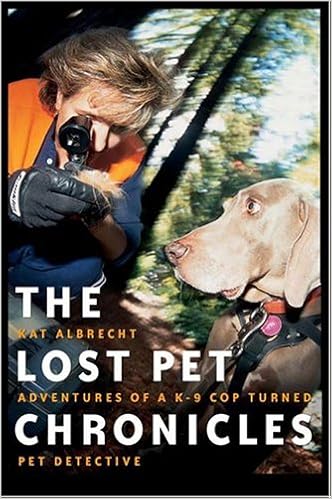The Lost Pet Chronicles: Adventures Of A K-9 Cop Turned Pet Detective
Kat Albrecht with Jana Murphy
2004, Bloomsbury
As a kid, the idea of chosing a dog of my own and training it to respond to my commands was pure fantasy. I had calendars and posters with dogs in my room, and I made a pastime of studying dog breed guides, carefully choosing the kind I would want for my own someday.
At 20, Albrecht got her chance and adopted a mixed-breed puppy whose background represented half of her chosen breed - Weimaraner. The other half was Australian Shepherd. With Katie, she had her first taste of owning and training her own dog, and success in the sport of flyball. Ten years later, she set out to acquire a purebred Weimaraner, and bought the puppy Rachel. At the same time, she began switching careers with the ambition of being a K-9 officer. Over the years, she trained Rachel as a cadaver dog and acquired a Bloodhound puppy named A.J. When the police career doesn't quite work out due to a combination of issues, she switched her dogs over to searching for lost pets.
It was then that I learned that the bulk of the search-and-rescue community considered tracking lost pets to be taboo. It wasn't that my peers considered the idea to be impossible - most just considered it to be beneath them.
In part, that attitude comes from pure practicality and the need to maintain the value of the dogs as human trackers - police dogs can't be distracted by animal scents while tracking a criminal or a lost child, after all. But part of it is a bit baffling. Since Albrecht had already retired her dogs from police work, she had no conflicts with their human training - now unneccessary - and after she lost one Bloodhound briefly in the woods, she had a new appreciation for the plight of owners searching for missing pets.
A very interesting book, both as a memoir and as a guide to how to find a missing pet. Cats apparently behave very, very differently than you'd think when they get disoriented from their normal routine, essentially going into a sort of silent emotional shut-down where they will not answer or go to their calling owners. Despite assumptions often made that skittish, fearful animals discovered running loose were abused or abandoned, many well-loved and spoiled house pets will behave skittishly and fearfully when lost. People who discover a stray pet will often be reluctant to turn it over to a shelter, the one place where the owner will go looking, and it's vital to put up large, unmissable signs so that they or their friends will realize that the 'abandoned' and 'abused' dog they found on the highway is really a lot pet.
Links
Author's Website
Missing Pet Partnership
MSNBC story
Sunday, October 4, 2009
Subscribe to:
Comments (Atom)
